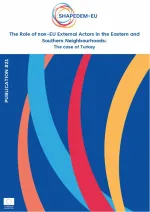The Role of non-EU External Actors in the Eastern and Southern Neighbourhoods: The case of Turkey

SHARPEDEM-EU publication 21
This paper analyses Turkey’s influence as a non-EU external actor in political dynamics in the European Union’s Eastern and Southern Neighbourhoods. It assesses Ankara’s discourses, behaviours, and tools as well as the impact on democracy promotion and authoritarian consolidation in Eastern Europe, the Caucasus, North Africa and the Middle East. It examines how Turkey’s foreign policy evolved from an initial emphasis on soft power and democratic inspiration—particularly in the aftermath of the 2011 Arab uprisings—to a more security-driven and interest-based approach amid its own democratic backsliding. The study shows how Turkey’s influence has been shaped by domestic political developments, ideological affinities, security concerns, and shifting regional alliances. It draws comparisons between Turkey’s engagement in the Southern Neighbourhood, where ideological and civilisational narratives were more prominent, and the Eastern Neighbourhood, where Turkey prioritised sovereignty and stability. It also maps the instruments Turkey uses—diplomacy, military presence, cultural diplomacy, and development cooperation—and the constraints posed by other actors and internal vulnerabilities.